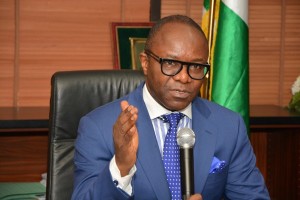
The Federal Government on Thursday stated that it had not sold the country’s refineries neither has it approved their concession to any individual or company.
Addressing newsmen in Abuja, Minister of State for Petroleum resources, Ibe Kachikwu, also disclosed that it would cost the country about $.12 billion to fix the three refineries.
He explained that a steering committee had been set up by the Federal Government, with a mandate to consider issues surrounding how to secure financing for the upgrade and repairs of the refineries, adding that the government was also considering inviting the original manufacturers of the refineries to participate in the process of revamping the refineries to help fast-track the process.
He said, “A steering committee was set up which also have a technical committee. The steer given by the Nigerian National Petroleum Corporation, NNPC, to the committee was financing the upgrade and repairs of the refineries. There is no issue of concession. We are not concessioning the refineries, it is simply a financing package.
“Two, once we have identified the individuals, see if we can make contact to those who built the refineries; to ensure we go back to them . The reason we will go back to them is because they have the designs, engineering outlay, upgrade capabilities and in some cases, they have access to the spare parts. If we are going to achieve this within the time period we are talking about, we need that sort of speed.
“We have largely decided that these are the people that we should use. But in terms of who wins the financing awards, that is still work in progress. We have not received from the technical committee their final reports. We still need to review, accept, and then go for Federal Executive Council, FEC, approval; and then the National Assembly, before we proceed with the process.
“Going by the highly technical nature of refinery upgrade, not a lot of people can participate; that is the reality. You have to have the financing, engineering know-how and market template. I do not expect that a lot of people would participate.”
He stated that the total cumulative amount to fix all the refineries was in the region of $1.1 billion and $1.2 billion, inclusive of the cost of fixing the pipelines, as the government intends to repair the pipelines from the southern to the northern part of the country and from Escravos to Warri.
To this end, he said, “The pricing mechanism for downstream products is such that very few people would undertake this type of financing and make returns. So that is why we have tried to create a business model that ties them into the Direct Sale-Direct-Purchase (DSDP) model, and that is still work in progress.
“When the committee have finished this, and done the analysis, I would expect they would then invite everybody who is interested, once the financial terms are set out. They would now present something to the Board, which would be approved; and then we get the President’s approval and then we proceed. We have not reached there, so anybody who is saying contract had been given is doing so in error.”
Kachikwu added that following that understanding, a presidential approval was granted the NNPC in October to engage credible financiers to rehabilitate and improve the performance of the three refineries and that three possible partners – Agip/Saudis/Qataris— were initially identified for engagements.
Kachikwu disclosed that as at today, efforts are still on to engage a pool of financiers after cost estimates for the refineries rehabilitation are firmed up later in the month.
With regard to the co-location of refineries, Kachikwu said that a public tender was announced in April last year and bids were received and analysed and winners for the Port-Harcourt and Warri refineries have been identified but that discussions are still on-going to finalise the process with approval to be given by both the NNPC Board and the Federal Executive Council.
He painted a sad picture of the massive import of petroleum products costing trillions of Naira which the nation has engaged in in the past few years as a result of its poor domestic refining capacity and said that efforts geared towards revamping the existing refineries are meant to save the country huge foreign exchange and the trillions of Naira spent on fuel imports.
Giving a chronology of efforts by the Federal Government to rehabilitate the ailing refineries and put them on stream, he said the tender process for financiers was truncated in May last year following concerns raised by the National Assembly and the Bureau for Public Enterprise, a concern that was thrashed out and an understanding reached that the rehabilitation process would not adversely impact any future FGN privatization initiatives.